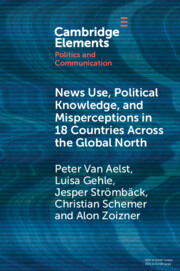Refine listing
Actions for selected content:
1299955 results in Books

Racial Doubt
- Slavery, Passing, and the Emergence of Black Writing in Cuba
- Coming soon
-
- Expected online publication date:
- March 2026
- Print publication:
- 31 March 2026
-
- Book
- Export citation

Reparations and Redress for Historical Injustice
- Coming soon
-
- Expected online publication date:
- March 2026
- Print publication:
- 31 March 2026
-
- Element
- Export citation
Language Rules!
- Secrets of a Uniquely Human Ability
- Coming soon
-
- Expected online publication date:
- March 2026
- Print publication:
- 31 March 2026
-
- Book
- Export citation

Beyond Grammar and the Lexicon
- Indicating and Depicting in Sign Language Discourse
- Coming soon
-
- Expected online publication date:
- March 2026
- Print publication:
- 31 March 2026
-
- Book
- Export citation

Coastal Meteorology and Forecasting
- Coming soon
-
- Expected online publication date:
- March 2026
- Print publication:
- 31 March 2026
-
- Textbook
- Export citation

White Supremacy
- A Short History
- Coming soon
-
- Expected online publication date:
- March 2026
- Print publication:
- 19 March 2026
-
- Book
- Export citation

Craft Work
- Making Form in a Broken World
- Coming soon
-
- Expected online publication date:
- March 2026
- Print publication:
- 31 March 2026
-
- Book
- Export citation

Physical-Geometric Optics for Light-Scattering by Nonspherical Particles
- Applications to Remote Sensing and Climate Science
- Coming soon
-
- Expected online publication date:
- March 2026
- Print publication:
- 31 March 2026
-
- Book
- Export citation

Monastic Desires
- Homoeroticism, Homophobia, and the Love of God in Medieval Constantinople
- Coming soon
-
- Expected online publication date:
- March 2026
- Print publication:
- 31 March 2026
-
- Book
- Export citation

Ordinary Chondrites
- The Most Common Meteorites
- Coming soon
-
- Expected online publication date:
- March 2026
- Print publication:
- 31 March 2026
-
- Book
- Export citation
Women, Wealth and Power in the Roman Republic
- Coming soon
-
- Expected online publication date:
- March 2026
- Print publication:
- 31 March 2026
-
- Book
- Export citation

Multiplicative Number Theory II
- Primes and Sieves
- Coming soon
-
- Expected online publication date:
- March 2026
- Print publication:
- 31 March 2026
-
- Book
- Export citation

Nineteenth-Century Literature in Transition: The 1810s
- Coming soon
-
- Expected online publication date:
- March 2026
- Print publication:
- 31 March 2026
-
- Book
- Export citation

Medieval Avatars
- Projecting Presence, Performing Emotions
- Coming soon
-
- Expected online publication date:
- March 2026
- Print publication:
- 31 March 2026
-
- Element
- Export citation

Beyond the Computer Metaphor of Mind and Brain
- Coming soon
-
- Expected online publication date:
- March 2026
- Print publication:
- 31 March 2026
-
- Book
- Export citation

Food Taboos in Archaeology
- Coming soon
-
- Expected online publication date:
- March 2026
- Print publication:
- 31 March 2026
-
- Element
- Export citation

News Use, Political Knowledge, and Misperceptions in 18 Countries across the Global North
- Coming soon
-
- Expected online publication date:
- March 2026
- Print publication:
- 31 March 2026
-
- Element
- Export citation

Forensic Linguistics in Indonesia
- Origins, Progress, and Prospects
- Coming soon
-
- Expected online publication date:
- March 2026
- Print publication:
- 31 March 2026
-
- Element
- Export citation

Editing an Early Modern Play
- A Practical Guide
- Coming soon
-
- Expected online publication date:
- March 2026
- Print publication:
- 31 March 2026
-
- Element
- Export citation

Catching Fire in the News
- The Necessary Conditions for Media Storms
- Coming soon
-
- Expected online publication date:
- March 2026
- Print publication:
- 31 March 2026
-
- Element
- Export citation
